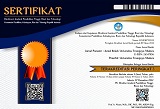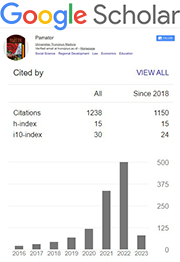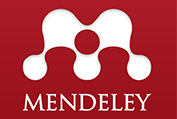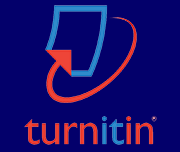ANALYSIS OF THE DEVELOPMENT STRATEGY OF UMKM FASHION HALAL LANGGAM BATIK BASED ON SUSTAINABILITY
Abstract
The success of MSMEs in developing the sustainability-based halal fashion sector will largely depend on the implementation of effective strategies, as well as their ability to compete in the local and international markets. Sustainability in the context of halal fashion MSMEs involves several aspects, including the use of environmentally friendly materials, efficient management of natural and human resources, and attention to the social and economic welfare of workers. This study aims to analyze the development strategy of Sustainability-Based Halal Fashion Batik Style MSMEs. This study uses a qualitative motto by using the Nvivo application that supports searching for common words in data processing frequencies, displaying analysis in the form of tables and word frequencies that often appear based on the results of data coding. The results show that the words that appear most often are development, environment, society, growth, sustainable, meaning there is a relationship between these factors. The results of the study show that Langgam Batik develops its business based on three main pillars of sustainability, namely economic, social, and environmental. In terms of economy, product diversification and marketing with social media. From the social aspect, these MSMEs play a role in community empowerment through job creation and the preservation of cultural heritage through North Sumatran batik motifs. From an environmental perspective, there are opportunities to implement more environmentally friendly processes, such as the use of natural dyes that are less polluting. Therefore, support from the government, academics, and the business community is urgently needed to expand market reach and increase the competitiveness of halal fashion MSMEs at the national and international levels.
Keywords
Full Text:
PDFReferences
Adams, The Future of Sustainability: Re-Thinking Enviroment and Development in the Twenty-First Century (Acc Publisher, 2006)
Barus, Hafiza Putri, Reni Ria Armayani Hasibuan, and Muhammad Ikhsan Harahap, ‘Analisis Potensi Industri Halal Dalam Meningkatkan Pertumbuhan Ekonomi Kota Binjai’, Al-Mutharahah: Jurnal Penelitian Dan Kajian Sosial Keagamaan, 21.01 (2024), pp. 540–51, doi:10.46781/al-mutharahah.
Daulay, Aisy Salwa, Imsar Imsar, and Rahmat Daim Harahap, ‘Strategi Pengembangan Pasar Digital Dalam Mendukung Industri Fashion Halal Di Indonesia’, AL-MANHAJ: Jurnal Hukum Dan Pranata Sosial Islam, 5.1 (2023), pp. 1035–42, doi:10.37680/almanhaj.v5i1.2918
Frida Yanti Sirait, Mulyana Fitri, and Chuzaimah Batubara, ‘Analisis Pengaruh Electronic Word Of Mouth Dan Kualitas Produk Terhadap Pembelian Ulang Halal Kosmetik Safi’, Syarikat: Jurnal Rumpun Ekonomi Syariah, 6.2 (2023), pp. 450–64, doi:10.25299/syarikat.2023.vol6(2).13654
Hasanah, Nuramalia, MUDAH MEMAHAMI USAHA MIKRO KECIL DAN MENENGAH (UMKM) (Uwais Inspirasi Indonesia, 2020)
Helmi, Muhammad, and Nurul Jannah, ‘Perkembangan Konsep Halal Suply Chain Dalam Industri Halal Fashion’, 9 (2023), pp. 194–207
Imsar, Imsar, Marliyah Marliyah, and Faisal Hamdani Harahap, ‘Strategi Pemasaran Warung Kopi Di Kota Medan Dengan Game Theory’, HUMAN FALAH: Jurnal Studi Ekonomi Dan Bisnis Islam, 8.2 (2021), pp. 20–32, doi:10.30829/hf.v8i2.9783
Kurniawan, Rudi, La Ode Alimusa, and Al Asy Ari Adnan Hakim, ‘Pengaruh Religiusitas, Dan Harga Terhadap Minat Beli Fashion Halal Dengan Sikap Sebagai Variabel Intervening Religiusitas (Studi Di Kota Kendari Provinsi Sulawesi Tenggara)’, Jurnal Ilmiah Ekonomi Islam, 8.3 (2022), p. 2748, doi:10.29040/jiei.v8i3.6496
Maleviti, Eva, Fundamentals of Sustainable Aviation (Milton Publisher, 2024)
Mustiah, ‘FASHION DALAM PANDANGAN ISLAM’, Journal of Edukasi Borneo, 4.1 (2023)
Pohan, Juwita Dewi Br, Marliyah, and Muhammad Lathief Ilhamy Nasution, ‘Penerapan Circular Fashion Pada Perilaku Hedonisme Generasi Z Dalam Perspektif Ekonomi Islam Juwita’, Jambura Economic Education Journal, 6.1 (2024), pp. 217–31
Rizka Putri Ramadani, and Imsar, ‘Analisis Peran Sumatera Trash Bank Dalam Meningkatkan Circular Economy Masyarakat Dengan Pendekatan Ekonomi Islam’, Syarikat: Jurnal Rumpun Ekonomi Syariah, 6.1 (2023), pp. 124–33, doi:10.25299/syarikat.2023.vol6(1).13865
Saepudin, Asep Bayu, ‘Dampak Fashion Halal Terhadap Industri Tekstil Tradisional Di Negara-Negara Mayoritas Muslim’, Jurnal Ekonomi KIAT, 35.1 (2024)
Saputri, Oktoviana Banda, ‘Pemetaan Potensi Indonesia’, Jurnal Ekonomi Dan Perbankan Syariah, 5.2 (2020), p. 24
Silalahi, P R, I Imsar, and A Fattah, ‘Industri Halal Sebagai Solusi Peningkatan Pertumbuhan Ekonomi Di Nusa Tenggara Barat’, Jurnal Ilmiah Ekonomi Islam, 10.02 (2024), pp. 1444–54
Simatupang, Yeni Kurnia, Agustina Mutia, Universitas Islam, Negeri Sulthan, and Thaha Saifuddin, ‘Analisis Manajemen Strategi Dalam Meningkatkan Ekonomi Kreatif Pada Industri Halal Fesyen Ecoprint Usi Modist Kota Jambi’, 8.12 (2024), pp. 487–507
Sitorus, Melly, and Ani Faujiah, ‘Peluang Industri Kreatif Fashion Halal Di Indonesia’, Proceedings of International Conference On Islam Education Management and Sharia Economics, 4.1 (2023), pp. 141–54
Srisusilawati, Popon, Salma Nabila Prasetyo, Siti Aulia Nur Hamidah, Raisa Adila Rihhadatull ’Aisy, and Reza Oktavia, ‘Tren Dan Perkembangan Fashion Syariah Pada Era Modern Di Kota Bandung’, Jurnal Ilmiah Ekonomi Islam, 10.1 (2024), p. 953, doi:10.29040/jiei.v10i1.12319
Tarigan, Azhari Akmal, Isnaini Isnaini, Tuahman Tuahman, and Indra Kurniawan Nasution, ‘Perlindungan Hukum Terhadap Masyarakat Muslim Kota Medan Tentang Produk Makanan Halal (Studi Proses Sertifikasi Halal Oleh Majelis Ulama Indonesia Kota Medan)’, Journal of Education, Humaniora and Social Sciences (JEHSS), 2.3 (2020), pp. 619–32, doi:10.34007/jehss.v2i3.135
Tyaswara, Baruna, Reza Rizkina Taufik, Mahardiansyah Suhadi, Ratna Danyati, and Akademi Bahasa Asing BSI Jakarta, ‘Pemaknaan Terhadap Fashion Style Remaja Di Bandung’, Jurnal Komunikasi, 3.September (2017), pp. 2579–3292
Wulansari, N. Y, D Ranihusna, and I Maftukhah, ‘Strategi Perencanaan SDM Untuk Peningkatan Daya Saing UMKM Batik Semarang’, Prosiding Pendidikan Profesi Guru, Fakultas Keguruan Dan Ilmu Pendidikan, 2020, pp. 1552–59
DOI: https://doi.org/10.21107/pamator.v18i1.29532
Refbacks
- There are currently no refbacks.
Copyright (c) 2025

This work is licensed under a Creative Commons Attribution-ShareAlike 4.0 International License.
Jurnal Pamator : Jurnal Ilmiah Universitas Trunojoyo by Universitas Trunojoyo Madura is licensed under a Creative Commons Attribution-ShareAlike 4.0 International License.















.png)